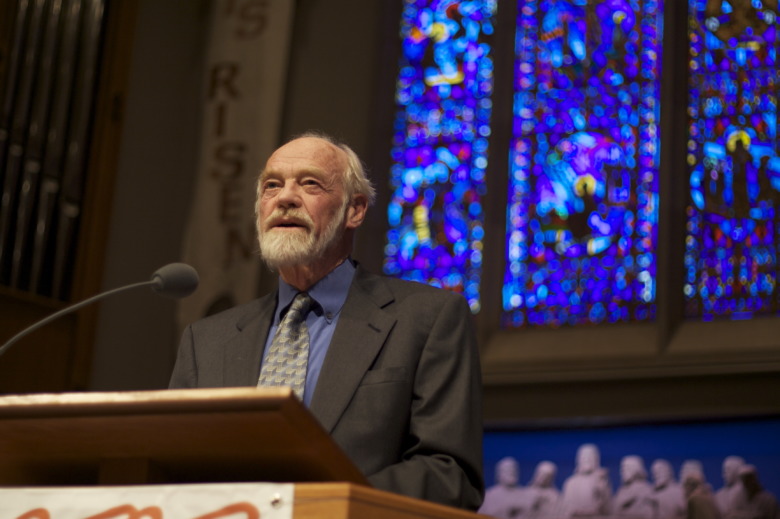
by Peter Santucci
The first time I met Eugene Peterson, he called me Steve. I’d signed up for half an hour with him in his office and somehow he’d heard “Pete” as “Steve” and I didn’t have the nerve to correct him. He had just published the first installment of The Message, his dynamic renderings of the New Testament, and I was in awe.
The rest of our half hour together was mostly spent in silence. I’d come armed with three questions and he’d answered them within the first five minutes. If you know anything about Eugene, you know he was always comfortable with silence — even if it made others feel awkward. And so we sat in silence; one of us in awkward horror and one of us in quiet contentment. A year later, I was his teaching assistant, and learning silence from him. And he learned my name.
One of the key images for Eugene’s life was drawn from Herman Melville. The image is of a longboat being rowed by a crew in pursuit of a whale. Every man is straining at the oars — all that is, except for one. One man is huddled in the bow, motionless and silent. A casual observer might consider this lazy, a waste of much-needed energy. But this isn’t laziness, it’s patience. This is the man with the harpoon. He needs to conserve his energy rather than expend it during the rowing, for he’ll use everything he’s got when it comes to harpooning the great beast.
This focused, patient attentiveness to doing his job instead of jumping in and doing something else that’s not his job drove Eugene to protect himself from distracting and diluting requests for his time and energy and attention. He required Regent College to turn off the ability for anyone to leave a voicemail for him. If anyone wanted to contact him, they’d have to put pen to paper and drop it in the mail. And when after putting it off for many years, he finally gave in and began using email, he guarded that email address diligently — as did all who had it. Even though I had it, I never used it, always resorting to snail mail for our correspondence.
One of my favorite memories of time spent with Eugene was when my oldest child was about 21 months old. He was a precocious talker and got Eugene to sing the “Eentsy Weentsy Spider” over and over again, which was glorious in and of itself. But my son mis-heard Eugene’s name as “You Gene” and called him “My Gene.” The name stuck. And very appropriately so.
Despite his silence and protection, Eugene was incredibly personal. In fact, the silence and protection were for the sake of being personal. He was keenly aware within himself and not just in others of our human ability to reduce others to functions: What information or actions can we get out of other people? To combat that, in the years I was his teaching assistant, he made sure we engaged personally and not just professionally. With Eugene, I was always a personal in relationship and never just an employee. Because of that, when it came time to work, he got everything I had to offer from a deep sense of loyalty.
That loyalty ran in both directions.
Both of us finished our years at Regent College at the same time. But he watched over me as a friend and mentor ever afterward. When I struggled to find work after graduation, he and Marva Dawn offered me a job editing together a class they had co-taught into what became The Unnecessary Pastor. Neither of them received a penny for the book. I got the entire advance and Regent College got the royalties. That advance got my family and me through the most difficult time of our lives financially. Could Eugene have written a check to get us through? Sure. But he and Marva retained my dignity by giving me good work to earn what I needed.
That book project and the subsequent work I did editing his collected articles, Subversive Spirituality, led to my further work on the study guides for his five-book magnum opus Spiritual Theology. But we’ll take a look at those in the next post.
Peter Santucci has been a pastor, a journalist, a hospice and hospital chaplain, and a volleyball coach. He blogs at petesantucci.com and is the author of Everyday Psalms. He and his family live in Bend, Oregon, where he and his wife host retreats for ministry couples. On occasion, he answers to the name “Steve.”
You can now preorder two collections of Eugene Peterson’s work in spiritual theology:

Eugene Peterson Spiritual Theology Series (5 vols.)




